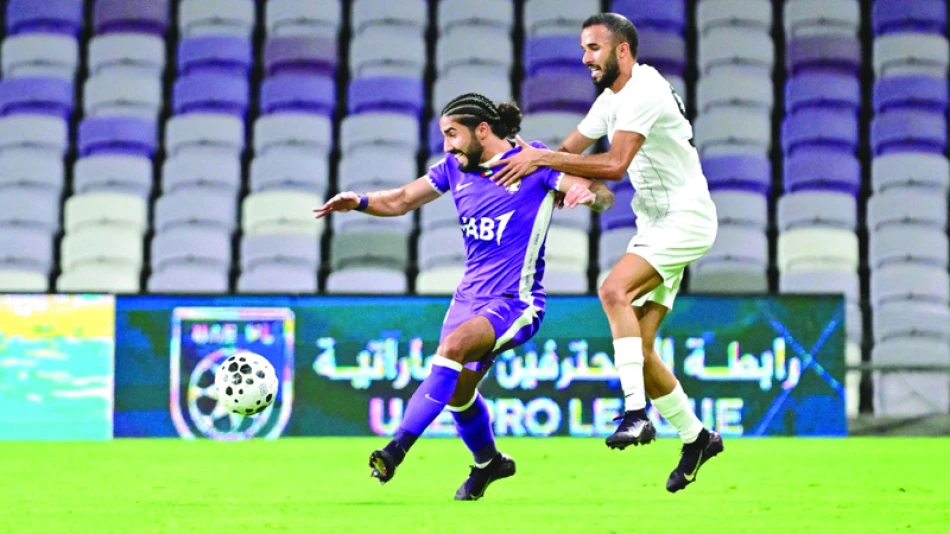
Outdated VAR Technology Sparks Controversy in Al Ain vs. Al Bataeh Match
UAE League Faces Credibility Crisis as Outdated VAR Technology Sparks Club-Federation Feud
The UAE's premier football league is grappling with a technology crisis that threatens to undermine match integrity and fan confidence. Former FIFA referee Abdullah Al-Ajel has identified obsolete Video Assistant Referee (VAR) systems as the root cause of controversial decisions plaguing the ADNOC Pro League's opening round, culminating in an unprecedented public dispute between Al Ain FC and the UAE Football Association.
Technology Gap Exposes League's Infrastructure Weaknesses
The controversy centers on Al Ain's 2-1 victory over Al Bataeh, where three goals were disallowed—two for offside and one for handball. Al-Ajel, speaking with authority from his international refereeing background, emphasized that while referee errors occurred, none materially affected match outcomes. The real issue lies deeper: inadequate camera coverage and outdated VAR technology forcing referees to manually draw offside lines with incorrect angles.
"The cameras for VAR in the stadium were insufficient, especially for dealing with offside situations," Al-Ajel explained. "This forced the video referee to create manual lines, but the dimensions were wrong because the offside angle was also incorrect."
Modern Leagues Leave UAE Behind
The technology gap becomes stark when compared to major European leagues. While the Premier League, La Liga, and other top competitions utilize sophisticated 3D angle systems providing precise imagery within seconds, the UAE continues relying on basic setups. This disparity not only affects decision accuracy but places referees under psychological pressure that undermines the sporting spectacle.
Institutional Conflict Reveals Deeper Governance Issues
The technical problems escalated into a full-blown institutional crisis when Al Ain publicly criticized match officiating. The club's statement triggered a sharp rebuke from the UAE Football Association, which rejected any questioning of referee integrity and announced legal proceedings against the club. Al Ain responded by referring the matter to "competent authorities" to protect its rights.
This public confrontation exposes concerning governance dynamics. While clubs have legitimate grievances about match officiating, the association's defensive stance suggests reluctance to acknowledge systemic infrastructure problems.
Regional Competition Intensifies Pressure
The UAE's football ambitions extend beyond domestic competition. The country hosts Club World Cup matches and competes for Asian Football Confederation recognition. Neighboring Saudi Arabia has invested heavily in football infrastructure as part of Vision 2030, while Qatar demonstrated world-class capabilities during the 2022 World Cup. The UAE risks falling behind regional competitors if technology upgrades remain delayed.
Market Implications and Investment Requirements
Professional football leagues increasingly depend on broadcast revenue and international partnerships. Controversial decisions and public disputes between clubs and governing bodies damage the league's marketability to global audiences and sponsors. The cost of upgrading VAR systems—likely requiring several million dollars—pales compared to potential revenue losses from diminished league credibility.
Al-Ajel's assessment suggests the solution is straightforward: "Bringing in modern equipment for VAR technology will reduce controversy around refereeing decisions and help referees in many aspects of match management, especially regarding speed and accuracy of decision-making."
Critical Juncture for UAE Football
The league faces a defining moment. Continued reliance on outdated technology will perpetuate controversies, erode fan confidence, and potentially damage relationships between key stakeholders. The federation must balance defending referee integrity with acknowledging legitimate infrastructure concerns.
Success requires immediate investment in modern VAR systems, expanded camera coverage, and transparent communication about upgrade timelines. The alternative—recurring controversies and institutional conflicts—threatens the league's long-term viability in an increasingly competitive regional football landscape.
Most Viewed News

 Sara Khaled
Sara Khaled






